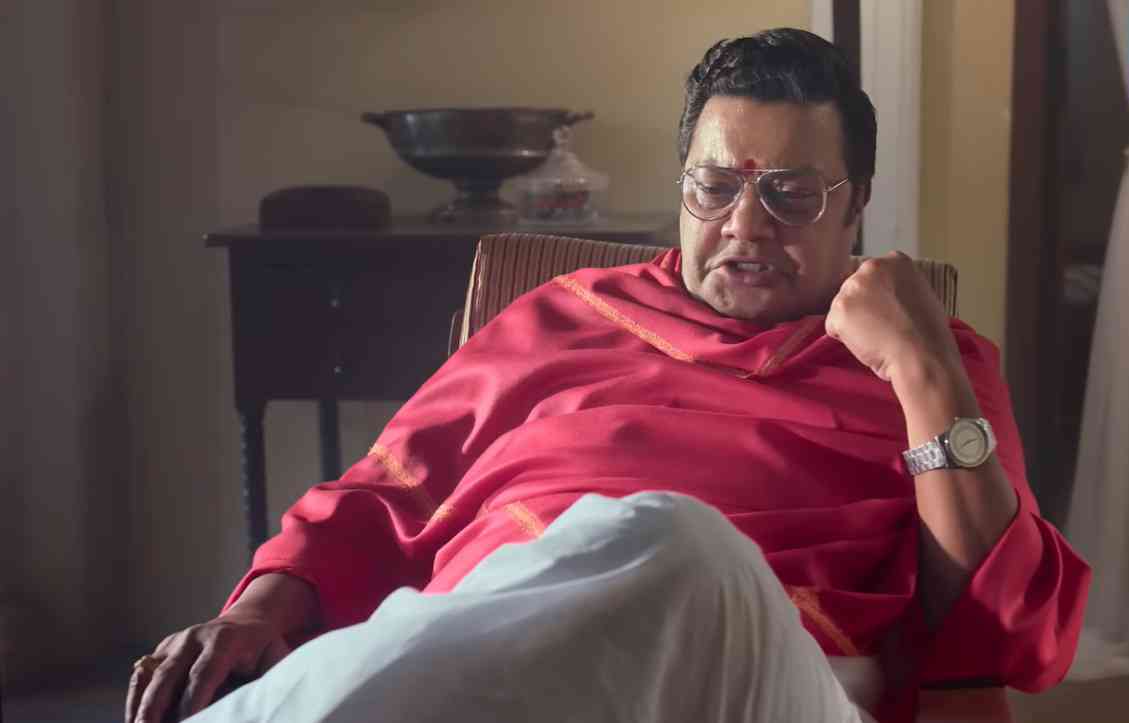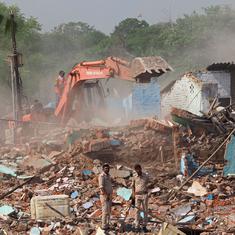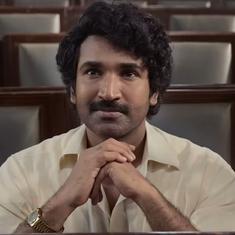The Telugu series Mayasabha: Rise of the Titans spans three decades of political developments in undivided Andhra Pradesh. The Sony LIV show’s first season dishes out a fictionalised, heavily spiced version of key events that took place between the 1970s and 1995.
The main characters are based on the luminaries who have ruled Andhra Pradesh as well as the country in the past. Although the names are made up and there’s no physical resemblance, N Chandrababu Naidu, YSR Reddy, NT Rama Rao, Indira Gandhi and Sanjay Gandhi are among the identifiable figures.
Mayasabha follows two friends whose twinned ambition takes them from being nobodies to somebodies. Before their names are acronymised, Kakarla Krishnama Naidu (Aadhi Pinisetty) and MS Rami Reddy (Chaitanya Rao) are striving in different corners.
Mayasabha opens with the declaration “The story of India is the story of caste”. Accordingly, Krishnama and Rami follow parallel trajectories dictated by their caste backgrounds until they meet during a bus ride.
Krishnama is keen to move beyond his farming roots, just as Rami wants to correct the reputation of his father, Shiva (Shankar Mahanthi), as a violent enforcer. Both young men are pragmatic idealists, eager to bring about social change, but also aware that power can be grabbed only by becoming insiders.
When the Emergency is declared in 1975, Krishnama initially sides with the sterilisation-obsessed goons unleashed by Prime Minister Iravathi (Divya Dutta) and her son Sandeep (Sakul Sharma) before Rami makes him see sense. With Iravathi’s party being the only major player around, Krishnama and Rami bide their time, learning how to navigate the caste-dictated selection process for electoral candidates and important posts.
The decision of movie star Rayapati Chakradhar Rao (Sai Kumar), or RCR, to challenge Irawati’s dominance shakes up state politics. The camaraderie between Krishnama and Rami is strained. They must choose between individual goals and the larger good, threatened oblivion and relevance that is tinged with compromise.

Deva Katta has created Mayasabha, in addition to co-writing and co-directing the show along with Kiran Jay Kumar. Seething with incidents and packed with names (and acronyms), Mayasabha is even more ambitious than its heroes.
The heavily dramatised staging and performances play to the gallery. Social movements are cursorily name-checked, foreclosing any possibility of a sober, let alone subtle, examination of far-reaching shifts in Andhra politics.
As the series follows its leads, it also takes in the rise of a Naxalite group (called the “Poor Man’s Army”), the resentment against Iravathi’s high-handedness, and rampant factionalism between various power-drunk politicians. At least one prospective chief minister is actually drunk when Iravathi arbitrarily picks him for the important position.
The events that unfold over nine episodes will make the most sense only to avid followers of Telugu politics. For non-Telugu viewers, Mayasabha is relevant mainly for what it says about the lure of power, the creation of political alternatives, and the bad old ways of the Congress party.
Despite tacky production values and a tendency towards caricature, Mayasabha recreates the backroom wheeling-dealing, rampant corruption and skulduggery that Krishnama and Rami must confront. It’s telling that the men, despite obstacles and setbacks, feel right at home in this world.
A bazaar mentality runs through the show’s version of the Congress. Iravath, played with pantomime imperiousness by Divya Dutta, is begging to be taken down. Dutta isn’t alone – most of the cast leans towards exaggeration, with Aadhi Pinisetty and Chaitanya Rao among the decent performers.
The cast includes Nasser as an influential newspaper owner and Tanya Ravichandran as Krishnama’s first lover. Among the secondary characters, Srikanth Iyengar is spot-on as Iravathi’s most ardent sycophant.
A dissenting judge warns Iravathi, you will give birth to a line of dictators who will impose an Emergency and not even call it one. History will blame you, he adds. This is one of the few scenes that gives a larger context to an overly long, often overwrought and enervating saga of the quest for domination.
Politics is about strategy, alliance and caste equations, not lofty ideas whether in the street or Delhi – these words hurled at Krishnama during his student activism phase hold true for Mayasabha too. Like Krishnama and Rami, viewers are dunked into the hurly-burly of politics, any larger ideal of public service long forgotten in the endless manoeuvring and jostling.










